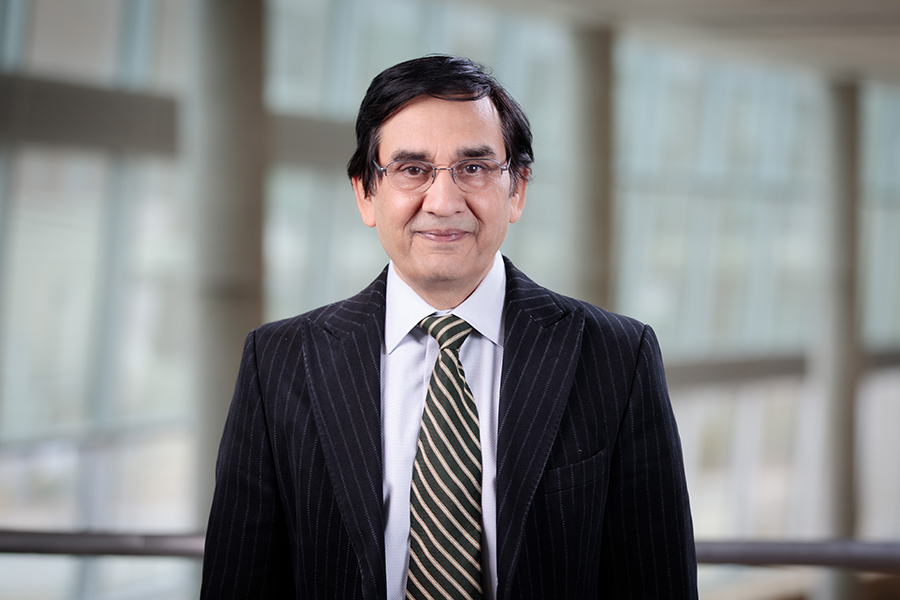Dhirendra Pratap Singh, PhD
Professor, UNMC Department of Ophthalmology and Visual Sciences

Dhirendra Pratap Singh, PhD, is a professor in the UNMC Department of Ophthalmology and Visual Sciences. Dr. Singh specializes in molecular and cellular biology. His research interests include age-related-blinding diseases — particularly the role of aging and oxidative stress in the etiopathologies of age-related cataract, glaucoma and corneal wound healing, and to discover the mechanism and target-based therapies to prevent or delay these diseases.
Dr. Singh and colleagues discovered the novel cell survival factor, lens epithelium-derived growth factor, which promotes the survival of many cell types, predominantly by up-regulating stress-related gene networks. Dr. Singh and his colleagues have also discovered that maintenance of the multifunctional protein, peroxiredoxin 6 in cells, is critical for survival of aging cells or cell under oxidative stress. Thus, Prdx6 could be a therapeutic target for treating or postponing age-associated blinding diseases, such as glaucoma, cataract, and macular degeneration.
Their research and forward-looking efforts have provided insight into basic molecular mechanisms of initiation and progression of age-related cataract, glaucoma, and other degenerative disorders, and have suggested plausible approaches to control or postpone these diseases.
Born in India, Dr. Singh came to the United States in 1992 as a Fogarty International Research Associate at the National Institutes of Health in Bethesda, Md., for two years. He moved to the Harvard Medical School as a junior faculty member in 1994, and joined the Center for Ophthalmic Research, Department of Surgery, at Brigham and Women’s Hospital in Boston as assistant director of Molecular Biological Research. In 2002, Singh joined the University of Nebraska Medical Center.
Dr. Singh received his PhD in molecular immunobiology in 1988 from Central Drug Research Institute, Lucknow, and Kanpur University in India. He received post-doctoral training in immunology and molecular biology at this same Institute and the National Eye Institute, National Institutes of Health in Bethesda. In 1986, he was awarded a travel grant from the World Health Organization to attend an international conference as well as to get training on molecular biological training at the University of Singapore. He has made several significant contributions in the fields of molecular immunology and cell biology, and in 1987 the Indian Society for Parasitology honored him as one of the best researchers in the country on the basis of his published work (Babar Mirza Award).
Dr. Singh received the John Mannick Research Award in the Department of Surgery at the Brigham and Women’s Hospital, Harvard Medical School, for his research on causes of aging disease-cataractogenesis. His efforts also have included research on the molecular mechanisms of many autoimmune ocular diseases. He has contributed much to understanding of the major immunological determinants of the classical retinal protein S-antigen. In this work, he found a remarkable similarity between the S-antigen determinants and specific sequences in several proteins extracted from microorganisms that also cause experimental autoimmune uveitis. His discovery of this cross-reactivity has helped re-define the immunological ideas of “self” and “non-self” determinants in ocular autoimmune diseases. He also found that a single amino acid substitution in the sequence of S-antigen can prevent the induction of the uveitis. This work constitutes a first-rate contribution to knowledge of the basic immunology of these potentially blinding diseases. Dr. Singh is well-published and pursuing innovative research and serves as principal investigator on many research projects. Based on his contributions to research, the University of Nebraska Medical Center recognized Dr. Singh as a 2008 Distinguished Scientist. His research team provides novel research applicable to understanding blinding disorders, and possibly opening the way to postponement of eye disorders and age-related degenerative disorders in general.
- Bachelor's: Gorakhpur University, Gorakhpur, India
- Master's: Kanpur University, Kanpur, India
- PhD: Central Drug Research Institute, Lucknow, India
- Postgraduate Training: Council of Scientific and Industrial Research, New Delhi
- Postgraduate Training: Laboratory of Retinal Cell and Molecular Biology, NEI, NIH, Bethesda, MD
General interests include uncovering the molecular mechanism(s) involved in cell survival, ways in which these survival processes go awry in various aging tissues/organs, and identification of the deleterious signaling and pathogenic factor(s) involved in the progression of age-related diseases, with the goal of developing the target-based therapy.
Through studying the mechanism and regulation of cell survival, our team has discovered three molecules: i) Lens Epithelium-Derived Growth Factor (LEDGF), which acts as a transcription factor; ii) lenticular Peroxiredoxin 6 (Prdx6), a multifunctional cytoprotective protein, and iii) Lens Epithelium-Derived Protein (LEDP), which maintains endoplasmic reticulum-Golgi homeostasis and regulates unfolded protein response. Dr. Singh research lab is involved in determining how these molecules are regulated during aging and how their expression levels affect the cellular homeostasis and cellular fate.
Dr. Singh's research has anticipated many major trends and contributed knowledge in several areas: i) the molecular mechanisms of pathological signaling involved in etiopathogenesis of age-related disorders, particularly blinding diseases; ii) the characterization of aging and oxidative stress-induced by external and cellular stresses in disrupting cell homeostasis; iii) application of the moonlighting protein Prdx6 to sick cells or enhancing endogenous Prdx6 transcription by means of naturally occurring compounds or by application of known anti-aging drugs, like Metformin or Hydralazine to postpone pathogenic signaling that causes disease state.
His current research has delivered interesting results and that results have a great potential in clinical setting for therapeutic viewpoint since both Metformin and Hydralazine are efficacious in activating antioxidant defense in aging mice lenses and in vitro and in vivo, including human lens cells, resulting in extended health span of cells and eye lenses.
University of Nebraska Medical Center
985540 Nebraska Medical Center
Omaha, NE 68198-5540